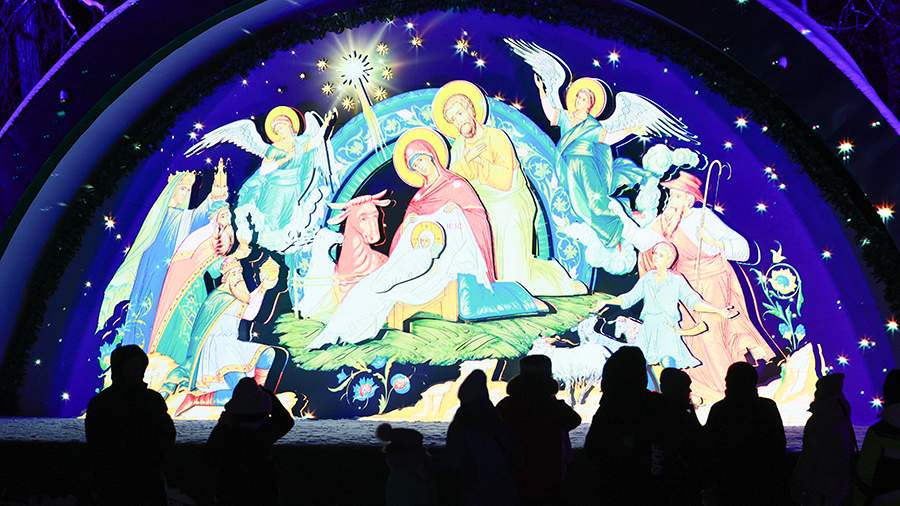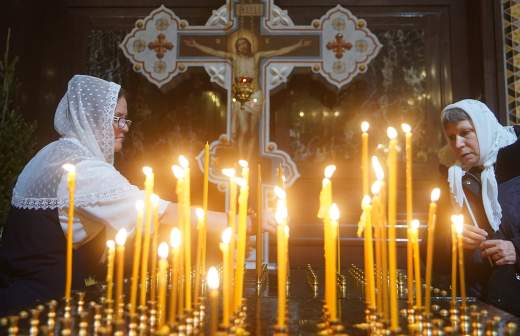January 7 - Christmas: history and traditions of the holiday

In early January, Orthodox believers celebrate Christmas - one of the main holidays of the church calendar, dedicated to the birth of Jesus Christ. In the old days it was called the winter Easter, as the Resurrection of the Savior is directly related to his birth from the Virgin. About the history and traditions of the celebration read in the material "Izvestia".
Christmas in 2025 - what date
Christmas is an important holiday for Christians of all denominations, because it marks the beginning of the earthly life of Christ. The Russian Orthodox Church celebrates it on January 7, and the Western Church and a number of local Orthodox churches - on December 25. Discrepancies in the dates arise because the Orthodox have a liturgical calendar according to the Julian system ("old style"), and Catholics and Protestants - according to the Gregorian system.
Since the II century Christmas was celebrated on the day of Epiphany - so called a large church celebration, dedicated simultaneously to three important events: the birth of Jesus, the Magi bringing gifts and the Baptism of Christ in the Jordan River. Christmas became an independent holiday only in the IV century, under Pope Julius. Now the Russian Orthodox Church calls Epiphany Epiphany, which is celebrated on January 19.
Orthodox Christmas - 2025: history
The events of Christmas are described in detail in the Gospels of Matthew and Luke. According to legend, the Roman Emperor Octavian Augustus announced a general census in his state, which at that time included Israel. According to Jewish tradition, a person had to leave a record of himself in the city from which his family originated. Therefore, Joseph the Betrothed traveled with the pregnant Virgin Mary to Bethlehem.
Because of the large number of census participants, the holy couple could not check into an inn in Bethlehem and had to spend the night in a cave where cattle were driven. There Mary gave birth to the Son of God, whom she named Jesus. She swaddled the child and put him in a manger, a feeding trough for the animals.
Not far from the cave in the field were shepherds with their flocks. At night an angel appeared before them and told them of the birth of the Savior. The astonished shepherds hurried to the place where the holy family was staying to worship the Divine Child and his mother. Thus, the first witnesses of the greatest miracle were not kings and wise men, but ordinary people.
After the Nativity, another important event occurred: a new star was lit up in the sky, which was later called the Star of Bethlehem. Its light brought wise men from the East, the Magi, to the city. They too came to worship the Son of God and brought gifts: frankincense (incense), gold and smyrna (resin for anointing the dead).
When King Herod learned of the birth of the Messiah, he ordered that all the babies under two years of age born in Bethlehem be killed. However, an angel warned Joseph of the danger to his son, and he managed to escape with his family to Egypt. There they were until the death of the tyrant.
Christmas in 2025: the traditions of the Orthodox holiday on January 7
The celebration of Christmas begins the day before, on Christmas Eve. This is the strictest day of the Christmas fast, during which people who observe the church statutes, abstain from food until the end of the service. Before the all-night vigil, it is allowed to eat sotsiv, a Lenten dish made of grain and honey. It is believed that it is this dish that gave its name to Christmas Eve.
From January 6 to 7, Orthodox churches hold solemn services that last until late at night. The main service of the country is held in the Cathedral of Christ the Savior in Moscow, attended by the patriarch. Immediately on Christmas Day, believers invite friends and relatives to visit, organize feasts and children's activities.
In Russia, both Christmas Eve and Christmas Day could be celebrated with a festive dinner. On the eve of the holiday traditionally prepared 12 dishes - by the number of apostles. The main treat was sochivo, which was used to start the meal. Also on the table were stuffed cabbage, dumplings, pancakes, vegetable salads, mushrooms, pickles and pastries. It was believed that it was necessary to try everything prepared.
On Christmas Day the food became more varied, meat and dairy products appeared on the table. Affluent peasants could slaughter a piglet or a lamb for the holiday, while the less wealthy ate poultry. Also on January 7 in the villages they prepared "kozuli" - small buns on butter in the form of goats, sheep and lambs. They served as a reminder of the stable where Jesus was born.
On the night before Christmas, children and teenagers would go caroling. They went around the courtyards in brightly colored costumes, singing Christmas songs and greeting the owners. For this they were thanked with baked goods, sweets, and sometimes even money. In some regions carolers carried a long pole with a Christmas star made of paper or cardboard.
From January 7 in Russia began Svyatki - special holiday days between Christmas and Epiphany (January 19). During this time believers visited their relatives, and also spent time caring for lonely old people, orphans, the sick and needy. Villages organized noisy festivities, performances, and fairs. Despite the condemnation of the church, many people did fortune-telling, performed rituals to attract a good harvest, and tried to see dreams.
What you can and can not do on Christmas Day on January 7
The Orthodox Church does not impose strict prohibitions on the celebration of Christmas. Fasting by this day has already been completed, so all restrictions on food are removed. However, the clergymen note that during the feast should not overeat and abuse alcohol.
On the holiday, you should not engage in heavy physical labor and household chores. Although there is no complete ban on work, at Christmas it is better to devote time to prayer, meetings with relatives and good deeds, so as not to overshadow the spiritual meaning of the celebration with everyday worries. In addition, you should not quarrel with others, insult them, gossip and swear. Such actions are regarded as a sin.
Omen for Christmas on January 7
In Russia, people carefully watched the weather on January 6 and 7, looking for hints in the world around them about how their future would turn out. Thus, a clear sky on Christmas Eve promised a rich harvest in summer. A snowstorm on Christmas Eve hinted at an early and warm spring, while a thaw hinted at cold spring months. Snowfall on Christmas morning was considered a good omen - it promised a profitable and successful year.
Earlier "Izvestia" told about the traditions of celebrating Catholic Christmas.
Переведено сервисом «Яндекс Переводчик»

